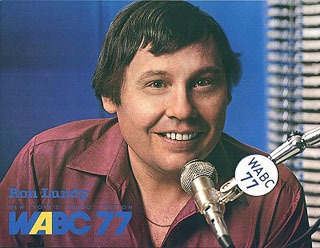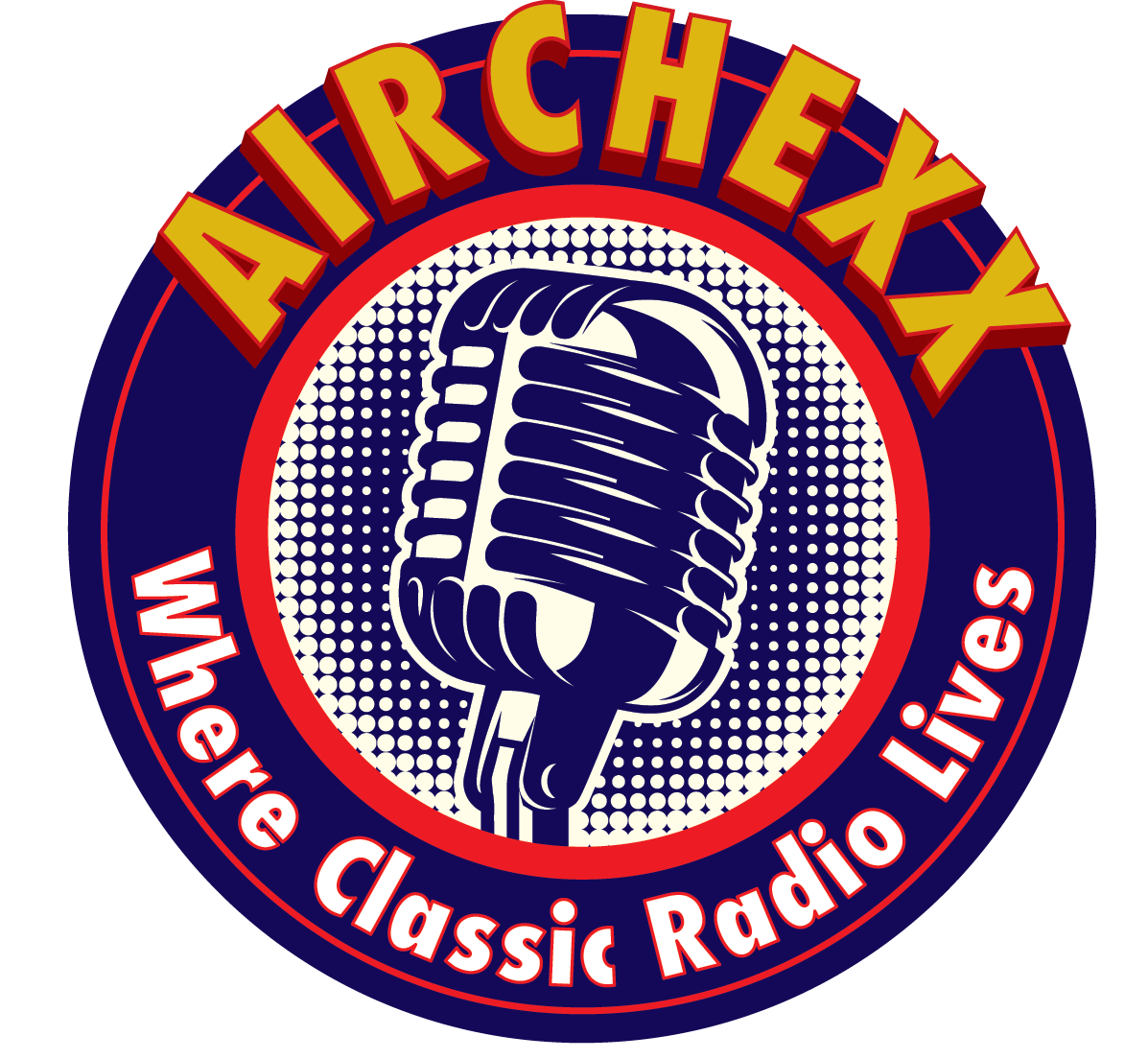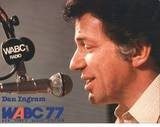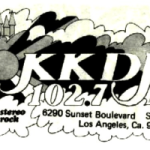When Matt Seinberg at Big Apple Airchecks said he was going to donate this Dan Ingram aircheck, he warned me, “Its kinda boring…”. Well, you’ve been warned.
Recorded one week before the biggest format change in New York City history, WABC can be described here as, sluggish, slow and boring. Its as if ABC brass was trying their best to chase any audience away. Remember, this is 1982 and only two years earlier, TOP 40 WABC was only number 2 in the city, right behind a Disco station. So why hasten the demise? Its been said that ABC knew the future of AM was talk and wanted to go out on top. Which might have been but it’s staple of talk programs in the beginning dropped ratings nearly into the cellar.
All that can be bantered around for another 30 years.
What we hear here is Dan Ingram trying his best to be himself – in a soft voice. His wit is still there, though, and that’s fun. There’s a few good songs heard in this 30 minute scope as well. So, for those of you who wish to wax nostalgic, here you go!






I remember NYC radio back then. The “Top 40” audience was split between 97WYNY and PIX 102 – until the next year. 66WNBC (“The Next (only) One”) was already mostly talk. One has to think that if the abortion called FCC AMStereo decision had been settled, if that wouldn’t have delayed the eventuality of WABC to talk and for how long.
I know this isn’t about WNBC but the comment was made, erroneously, I think about Top 40 in NYC in 1982. One thing is for sure, 97.1 WYNY was NEVER a top 40 station. Soft Rock which morphed into mainstream AC at one point, but never Top 40 or CHR. Went Urban as WQHT after WHTZ came along.
I must agree with you, partly, about the AM stereo discussion. Had the FCC finally settled on C-QUAM, Harris or one of the other systems out there as early as the late 70s, AM music stations would likely have stayed around a few years longer, and thats ONLY if there had been an FCC mandate that every vehicle sold had an AM Stereo receiver at the point of sale. The Feds have been completely asleep at the wheel on that regard at every opportunity. When this abortion they call HD radio was agreed to, the Commission NEVER went the extra step of mandating HD ready receivers be sold in every vehicle and every place table radios and boomboxes were sold as a condition of manufacture. So, because of that, both technologies and anything in the future are immediately rendered useless. Technology that nobody can hear is a waste. And, the only thing that failing to require HD receivers in every new vehicle sold after 2007 that has happened was that local stations were given a tool to ensure that local listeners couldn’t and still can’t listen to a competing station in a neighboring market, because the white ‘digital hash’ noise on either side of an HD station’s frequency renders a three-channel block unlistenable. Well. Kudos to Corporate radio for getting the out of market issue settled. Nothing like blocking technology… but I digress. And now it doesn’t even matter because everyone’s listening to Pandora or Slacker or whatever. Jockless.
Thanks for the inspiring comment. I really went off on a tangent on that one. 🙂
Great to hear Dan, he has always been my favorite! The news, spots… Great voices, we thought we were so cool back then.
This makes me want to go back to 1982. Thanks for the great post!
“…T-20 and counting…”?? Was the flip to talk supposed to happen after May 10?
Perhaps I am in the minority, but I like Dan Ingram in this context. His more relaxed approach demonstrates a maturity, and this style really shows us how good is voice is. Ironically, there is probably more personality exhibited in this period of WABC than there was during much of the 1970s. Nostalgia sometimes clouds our judgments.
As for the AM stereo argument, many overrate the technology. Even the best AM stereo technology would never be as good as the FM listening experience. I believe in maintaing free market activity whenever practical, so I afplaud the FCC for not getting involved, regardless of the unfortunate results.
You make a good point about nostalgia. If this were not WABC, it would be easier to judge the station’s sound as a personality AC on its own merits. As it is, so many of us remember the Top 40 version and so there’s no comparison.
The AM Stereo issue may never be settled. True, it was a dated technology, as history will show IBOC “HD Radio” to be. The issue, perhaps, may not be why no standard was adopted in 1979, but why the FCC wouldn’t allow AM Stereo transmission when the technology was developed in 1959. Imagine what might have happened had AM stereo receivers hit the market in the 60s, instead of the blossoming FM stations? Which, I believe, was the reason AM stereo was initially prohibited, so as to allow FM to grow.
I intentionally purchased a Delco AM Stereo for installation in a car I purchased in 1986. It sounded incredible. To my ears, BETTER than FM stereo. However, I preferred the AM Compression and processing that the AMAX units used over uncompressed FM. And even that goes into an engineering discussion about Compellor units, etc., which goes way over some people’s heads.
Today’s HD Radio is virtually ignored by the listening public. Moreso than AM Stereo was. Seemingly nobody cares. The technology is useless, except for use as an STL for stations with translators. And it could have been so useful to stations, giving them two and three stations for each frequency, if only the FCC had mandated HD be required in all receivers when IBOC went online. All wasted, in my opinion. There are some things that you can’t let the market decide, because in this case, it was more costly to manufacture HD receivers, and few people purchase FM radios anymore. So.. there you go.
Dan was a great radio personal,he was the #1 radio person in the afternoon for many many years.If WABC radio changed its format like WLS 89 Chicago, played more top 40 hits one or two album cuts and less disco hits. the music could have survived well into the 80s.
Ed, its very easy to say that, given that ABC had the talent, the signal and the heritage. But, all things were not equal. For one thing, New York City’s FM audience was further along than Chicago, especially in established Rock stations. WABC simply couldn’t go in a Rock-40 direction, as good as it probably would have sounded. The place for WABC from the beginning, was dead center of the Top 40 genre. What did them in so early, in my opinion, are two things. First, Al Brady was no Rick Sklar. He should not have taken the station in a Disco direction. WABC never went after fads prior to 1978 and this was a mistake. Brady shouldn’t have tried to ‘fix’ the problem by firing three of his best jocks, either. Harry Harrison still had better numbers than Imus, Chuck Leonard was key in keeping minorites listening to WABC, and George Michael was one of the best post-hitters in the business. In Michael’s case, they did him a favor, as he wanted to go into sports and did very well on Television in that regard.
The second reason was going AC in 1980. While nobody will ever know for sure what made brass make the decision when they did, landing the Yankees broadcast rights took Howard Hoffman off the air most evenings, and therefore the music power hours were gone, along with teenagers. Plus the scare from WKTU and the fact that collectively, FM had eaten away at WABC’s huge numbers from the 60s through the mid-70s, and whole books have been written which indicate that ABC corporate simply would not stand for the great WABC to play second fiddle. So they went after adults.
In the end, its likely that nothing, not AM Stereo, not the best top 40 jocks in the business, could have kept corporate from flipping WABC to a format that was better suited to the purchasing power of adults.
The flip from personality AC to talk, on the other hand, was a move that they took a gamble with. In 1982, the talk format was far from an established ratings winner, and they took a gamble with John Gambling… and suffered for the first two years outside of Gambling’s show. It even could be argued that WABCs Talk format didn’t explode until Rush Limbaugh… on August 1, 1988.
Sorry for the rant, but… well you could expect the Airchexx webmaster to be passionate, couldn’t you?
Sorry, have to make a couple of corrections. The so-called Disco direction (which I consider to be more of a tweak) was undertaken before Brady came on board. While it’s easy to say in heind sight that Brady shouldn’t have gotten rid of the three jocks, I don’t think that was necessarily what lead to WABC’s eventual formatchange. Maybe it would’ve been better if Brady had kept the three jocks and tweaked the sound toward an AC direction.
Concerning the comments about Talk Radio-77, John Gambling didn’t join WABC until well after 1982. And it was really Bob Grant who turned WABC into a Talk radio success.
As for HD being mandated by the FCC, it probably would’ve been a messy transition. We saw how well the attempted implementation of the Metric system succeeded. The only reason the digital TV conversion worked (to the extent as it has) is that many, if not most TV viewers get their TV through a middle-man, the cable provider. You’re not going to entice people to purchase new radio equipment, just to get slightly better sound quality and a few more stations, when they can receive what seems like an infinite number of choices on the web. And those choices can be audio, video, and a combination of both. Radio benefits from the fact that it is virtually ubiquitous and easy to use.
Nick, you are right. Thinking back I had thought the disco moved in in early 79 but it was before Brady. I can’t help but think of am stereo the way I do and you make a good point about the metric system.
I’ve read much about the change of WABC and here is a summary.
WABC had their highest ratings just prior to the KTU book. They were number one 12 plus and the highest cume in the country. Keep in mind it wasn’t just KTU, it was WBLS that also drew many WABC listeners to FM. WABC relied on the cume because their time spent listening was small. So when the cume moved to FM the low TSL into a lower cume equaled trouble.
The PD at the time was Glenn Morgan, not to be confused with the guy at 99X. Morgan told Apple Bites he tried to reassure management the bad book was a fluke and any major changes would not be advised. Management instead brought back Rick Sklar and moved Morgan out of the PD chair. It was Sklar who added more disco as a counter programming move that did more damage reenforcing WABC as a disco station.
Then Al Brady Law was brought in as PD to fix the problem. Law knew the younger demos were not coming back so he tried to move WABC to a full service AC direction much like his work at WHDH Boston. However, ABC management still wanted teens and older demos. That wasn’t possible so Law left and in came Jay Clark who continued the transition until talk.
It seems the decision to change WABC to talk was made when ABC management asked the question, “Will WABC ever be successful as a music station again?” The answer was, “No.” Plus their research indicated that everyone knew WABC existed but simply didn’t use the product like they once did.
Perhaps it was good WABC ended the way they did. Someone mentioned WLS and they were able to hold on until the mid eighties. But long time PD John Gerhon and Larry Lujack left in mid 1987 and the station spiraled into the ratings basement before changing to talk.
Thanks for the clarification. As for WLS, I was a DX listener and from a listener point of view, WLS was great until they moved away from Rock-40 and into middle-of-the-road territory. Even in 1986, when the station was still playing the likes of Bob Seger but had a lot of talk mixed in, it was worth listening through the talk for the next song. Once they gave up on the good Rock mix, as far as I, a young rocker was concerned, it wasn’t even worth flipping to AM.
I say that as a former listener, not as this site’s webmaster. Sometimes, its worth looking at things from the listeners’ point of view. We all know the numbers and why all the AM rockers gave up.
As a matter of fact, by 1980 (as you stated in your introductory comment, two years before WABC went all-talk), it was WBLS that was the #1 station most of the time (if it didn’t, say, switch the #1 and #2 spots with WKTU) and for most of the early 80s, period. Plus, as Nick Serames pointed out, Bob Grant made WABC a success as a talk station–and that was in the fall of 1984. That was the beginning of WABC’s talk format as New Yorkers know it today. Bob had been on the station for almost four years by the time Rush joined it–first as a local host, then as host of his syndicated show, at one point (probably initially) concurrent with one another. For a time, his syndicated weekday show was broadcast via tape on the weekends, especially when he did his local show. (His live WABC show was later followed by his live national show until the former was later cancelled circa very early 1990s at the latest.)
As I asked after listening to one of the Los Angeles airchecks (KHJ, I think), I wondered why ABC didn’t just move the Top 40 (nowadays called CHR) to WPLJ? They did in 1983, but really, I should have asked why ABC didn’t do it seamlessly. Though I was a WNBC fan, it was sad hearing this, knowing that in ten days WABC would junk the music format.